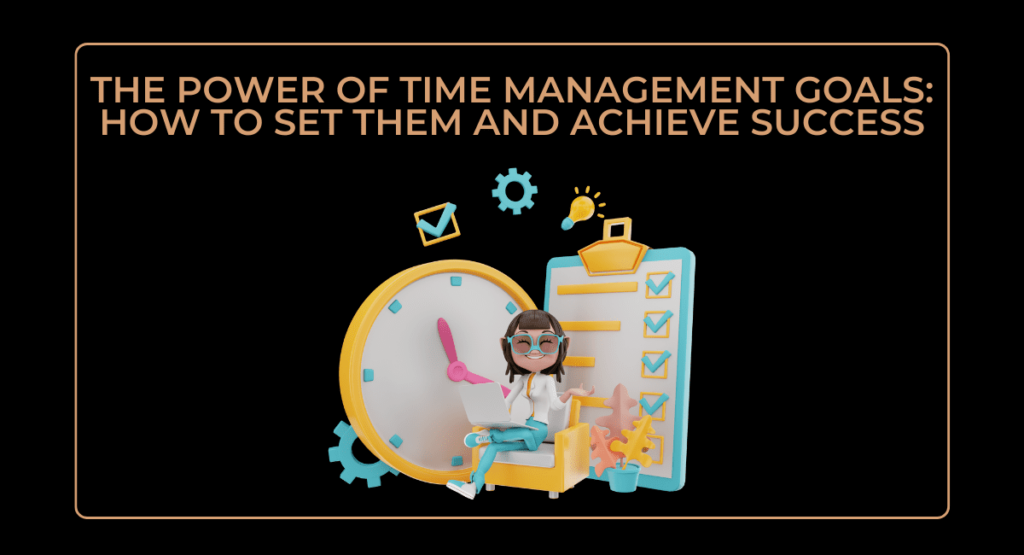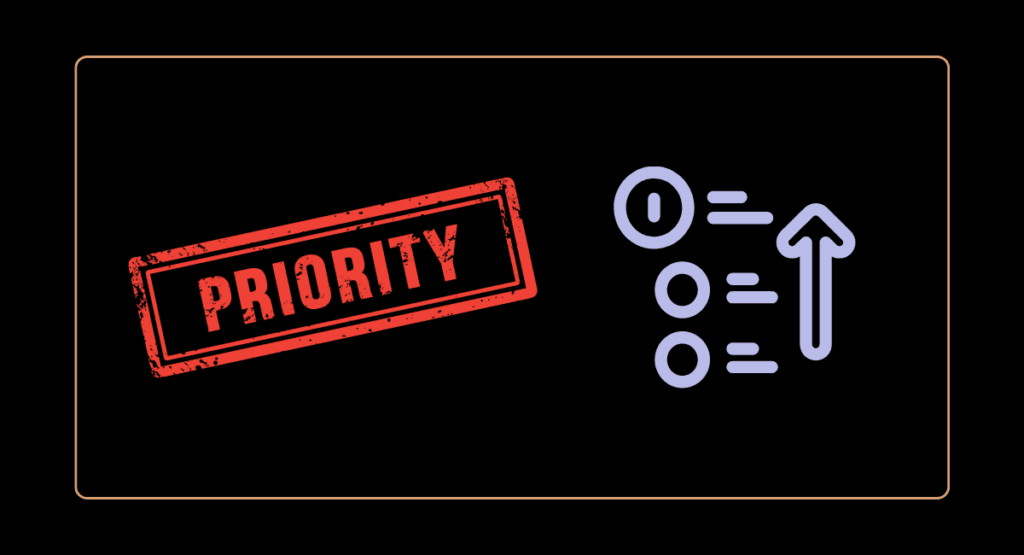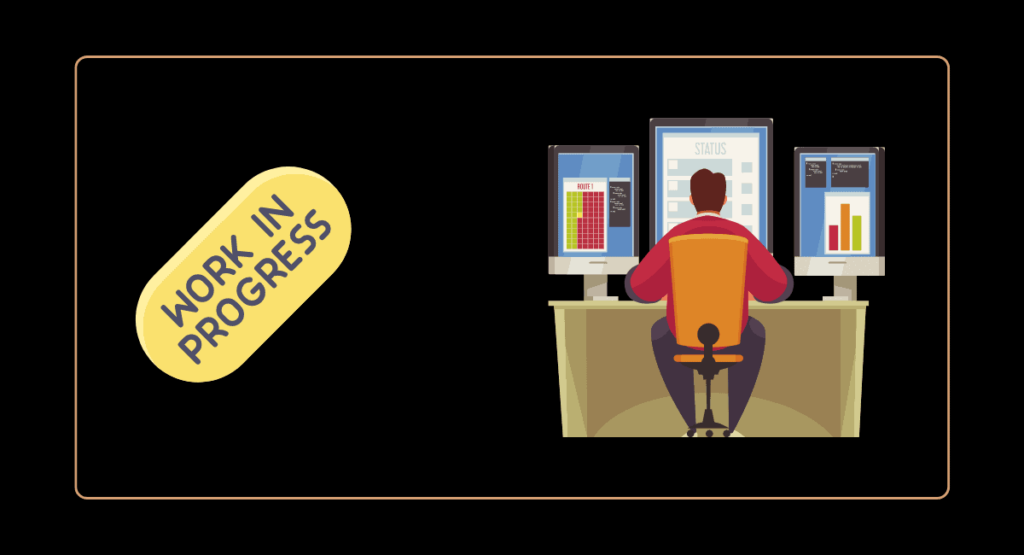The Power of Time Management Goals: How to Set Them and Achieve Success


Do you ever feel like there never seem enough hours in the day? Are you constantly trying to juggle competing tasks and obligations?
It’s a common feeling, but it doesn’t have to stay that way! Setting time management goals can help you make the most of your time and reach success.
This guide teaches how to set effective time management goals and achieve success.
Let’s get started!
Defining Your Time Management Goal

“Proper time management, self-confidence, courage & good thoughts are the initial means for success and meaningfulness of life. Therefore, be conscious and truthful towards your goals.” Swami Avdheshanand.
It is important to have a time management goal. This is a goal that helps you plan and manage your time effectively. These goals can help you succeed in whatever tasks or activities you decide to do.
Setting a goal for yourself can be done in three steps.
1. Decide what you want to do and set a timeline for completing it.
2. Break down the task into manageable chunks so that it’s easier to complete.
3. Set specific times to work on the task each day or week to achieve a quicker result.
Effective time management skills will help you reach your goals sooner and with less stress and frustration.
When setting up a timeline for completing tasks, ensure that it is realistic so that there isn’t too much pressure on yourself when working towards achieving them.
With dedication and focus, any goal is possible!
Identifying areas that need improvement
Identifying areas that need improvement in your time management skills are important. This will help you reach your goals quickly and without feeling overwhelmed.
To do this, Ensure you have a plan and timetable for completing your tasks or activities.
Break down the task into smaller pieces. It is easier to manage. Then plan specific times each day or week to focus on getting the job done.
Determining specific tasks or projects to focus on

Choosing specific tasks or projects to focus on is essential when working on something. This will help you prioritize and manage your time better. It lets you stay organized and figure out the best way to complete a task or project.
When determining which tasks or projects to focus on, consider how much time each needs. And you know how quickly you need it done.
You should also consider what resources are available for each task. And check if any skills need improvement during the process.
After deciding which tasks or projects need attention, take small steps to complete the entire project, one step at a time.
Establishing short-term and long-term goals
Businesses need to set short-term and long-term goals. Short-term goals are objectives that companies must accomplish within a year or less. Long-term goals are objectives that require more than one year to achieve.
Setting both types of goals is crucial as they help the business focus on what it needs to do to reach its desired outcome.
It also helps keep the business organized to stay on track and achieve success over time.
Get more out of your business
Get the best employee engagement content every week via mailing list
Establishing Priorities & Strategies For Reaching Your Goals

Priorities are important when you want to reach a goal. Setting priorities helps you focus on what is most important first to move closer to achieving the goal.
Strategies are different ways of doing something. Strategies help you reach your goals faster by breaking them down into smaller parts.
Prioritizing and strategizing your goals means figuring out the most important thing to do and then doing it first.
Sticking To Your Plan & Setting Yourself Up For Success
Sticking to your plan helps you reach your goals and be successful. A good plan should have clear steps to follow, so you know what to do daily.
Setting yourself up for success also means having the right tools in place. One of the ways to manage your time is to create a daily schedule. Having these things in place will help make sure your plan works out as expected.
It’s also important to remember that achieving success takes time and hard work. You might not get there on your first try – but don’t give up! Stick with it, and soon enough, you’ll start seeing progress toward reaching your goals!
Finally, remember to celebrate when you reach milestones. It can help motivate you even further and give you a much-needed break from working hard!
Celebrating successes helps keep us motivated toward our ultimate goal of success!
Avoiding Procrastination

Procrastination is a problem that affects many people. Procrastination can be avoided by following important time management tips.
The key to avoiding procrastination is focusing on important tasks. You should be allocating enough time. Breaking large tasks into smaller chunks makes them manageable. It is easier to manage.
Setting deadlines and rewarding yourself when you meet them is an excellent way to stay motivated.
Finally, limit distractions and create an organized work environment conducive to productivity.
These simple yet effective tips can help anyone overcome procrastination and get the most out of their available time.
Benefits To Long-Term Goal Setting
Setting long-term goals can be very beneficial in helping you achieve success. Long-term goal setting provides time management techniques to plan out how you will go about effectively managing tasks and time.
Long-term vision allows us to focus on the lifestyle we want to live. It is a guiding light that helps us make better decisions. Keep us motivated and reach our full potential.
It also provides an opportunity to manage resources to enhance outcomes effectively.
Additionally, by creating timeframes for smaller milestones, it can become easier to stay focused and remain encouraged when the going gets tough since an ultimate goal is always in sight.
Ultimately, long-term goals serve as markers of our successes and help keep us motivated as we strive toward achieving our dreams.
Managing Distractions & Negative Thoughts

Managing distractions and negative thoughts can be challenging, especially in today’s world, where things like social media and to-do lists are ever-growing.
You need to identify common sources of distractions. So you can focus on your crucial tasks.
Consider taking a look at your to-do list and setting realistic deadlines for yourself to keep you motivated and on track.
It can also help immensely to have your own projects to work on, as this will bring you joy and make you feel more focused on completing specific tasks.
With the proper strategies in place, successfully managing distractions and negative thoughts is just within reach!
Scheduling Downtime & Maintaining Flexibility
Having a time management goal is essential for achieving a balance between work and personal life.
Allowing for flexibility in a schedule helps accommodate unexpected schedule changes so that it is manageable.
With compromise and understanding of individual commitments, we can schedule downtime in our daily lives.
Monitor Your Progress

Taking the time to track progress towards short-term goals can be a crucial ingredient of success.
Scheduling regular check-ins to account for successes and failures is essential in determining the effectiveness of your strategies over time. This will help you adjust your strategy and use unexpected opportunities without wasting time.
For effective goal completion, set a reasonable time limit for each task. This will keep you on track and provide benchmarks for assessing your performance.
Keep in mind monitoring your progress is as critical as setting goals– after all, it’s impossible to make adjustments if you don’t know how far you’ve come!
Regularly monitoring your progress will ensure that you stay on track and make adjustments when necessary—this is especially relevant when working on complex projects.
Keeping an eye on what you’ve already done (and evaluating it against your ultimate goal) ensures that you’re making steady progress toward success.
Delegating Tasks
Effective time management requires setting goals and efficiently delegating tasks.
Knowing which important tasks can be delegated to others, utilizing available services or apps, is a key step in achieving time management goals.
Services, apps, and websites can help make this process easier and more efficient by helping to sort through all the options. Delegating tasks to others can open up new possibilities for individuals to maximize their time and get more done.
By exploring these options, people can improve their time management skills and ultimately increase productivity.
Optimizing Your Routines & Habits

An excellent way to manage your time is to establish effective routines and habits and reach your goals more effectively.
Taking the time to analyze existing workflows and build goal-oriented habits can help streamline routine tasks and free up time for the more critical aspects of life.
It’s essential to understand that goal setting isn’t enough; you must also consider what sounds, smells, feelings, images, and activities will help get you there.
While it’s essential to focus on our professional lives and make sure we accomplish our daily tasks promptly, it’s equally as crucial to create habits that promote a healthy work-life balance.
The Benefits Of Setting Completion Deadlines
Setting completion deadlines is a powerful goal-setting tool for staying organized and productive. The deadlines help us to prioritize our tasks and when they should be done and helps us hold ourselves accountable.
By setting deadlines, we are creating a visual reminder of our goal and can readily track time wasters that get in the way of our productivity.
Additionally, goal-setting and completion are scientifically proven to provide motivation; better yet, the feeling of accomplishment after meeting a deadline also boosts endorphin levels.
Completion deadlines are vital for effective time management, organization systems maintenance, and personal development.
Frequently Ask Questions
What are people’s most common mistakes when setting time management goals?

People often make mistakes when setting time management goals by not being realistic. They should learn how long tasks will take or not allocate enough time.
They may also overestimate their multitasking ability. It’s leading to wasted time and unfinished tasks.
Lastly, they may underestimate the amount of rest needed to be productive throughout the day.
Creating a schedule that is both achievable and challenging simultaneously is crucial. Additionally, it is essential to build in breaks during the day, so you don’t burn out.
How can I stay focused on achieving my goals despite distractions?
You can’t stay focused and on track toward reaching your goals when there are many distractions. The key is to focus on what’s important and focus on it first.
By doing this, you can limit the amount of time spent on less critical activities.
You can also break down big tasks into smaller pieces, so they seem manageable and easy to accomplish.
You should never forget why you committed to achieving a particular goal. It will motivate you when it gets tough!
What benefits can I expect from setting deadlines for my tasks?

Setting deadlines for your tasks can be very helpful in keeping you organized and on track. It helps you to focus on completing each task by a certain date, which will help save time in the long run.
With deadlines in place, it becomes easier to prioritize your work and ensure that nothing falls through the cracks. This also keeps you focused on finishing each project quickly and efficiently so you can move on to the next task.
Deadlines are an essential tool for staying productive!
How can I motivate myself to stick with a routine or habit that will help me reach my goal?
Sticking with a routine or habit can help you reach your goal. To motivate yourself, break the task into smaller, easy parts, then reward yourself when you complete each part.
You can also set short-term goals and recognize them every time you reach one of them.
Finally, find someone who will encourage and support you on your journey.
With these tips in mind, you’ll be more likely to stay motivated and get closer to your goal!
What techniques can I use to optimize existing routines and habits for better time management?

Time management is about learning how to make the most of your time so that you can accomplish more in a shorter amount of time.
To do that, you can first Identify the activities that consume most of your time. Then take steps to streamline them or find ways to save time.
Set realistic goals for each day and make sure to stick with a clear plan of action.
Finally, learn how to prioritize your tasks and keep distractions like social media from wasting valuable time.
Conclusion
Setting effective time management goals can be incredibly powerful in helping you create the life of your dreams. It’s important to remember that these goals should always focus on what will benefit YOU and not just please other people.
By taking control of your schedule, setting realistic expectations for yourself, and breaking down large tasks into smaller ones, you can ensure that each day is as productive as possible without feeling overwhelmed or stressed out.
With a little effort, anyone can learn how to manage their own time more efficiently and reap the rewards of doing so!


